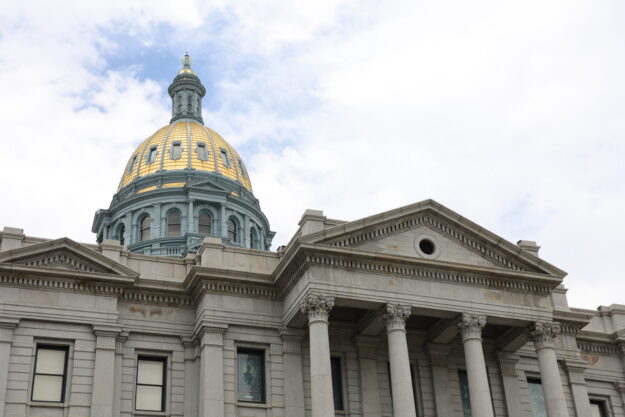Widgetized Section
Go to Admin » Appearance » Widgets » and move Gabfire Widget: Social into that MastheadOverlay zone
Coloradans launch bid to amend constitution so governor can redistrict in a national electoral emergency

The Colorado Capitol Building in Denver on June 25 (Delilah Brumer/Colorado Newsline).
As Texas Republicans redraw the state’s congressional map to their advantage and prompt other states to consider rare mid-decade redistricting attempts, two Coloradans want the governor to have emergency authority to alter Colorado’s districts to restore partisan balance in Congress.
Legislative Council Staff received an initiative filing about emergency congressional redistricting on Monday, filed by Brandon Cary and Jorge Rodriguez. The proposed constitutional amendment, which would be on the 2026 ballot if it clears the procedural gauntlet of approval, would allow the governor to suspend the state’s independent redistricting commission and appoint a temporary body to redraw congressional districts to respond to any “national redistricting imbalances.”
“Texas is taking direct orders from the (U.S Department of Justice) and the current White House administration to do this redistricting,” Cary, who lives in Wheat Ridge, wrote in an email to Colorado Newsline. “Other states can counterbalance their efforts, and in the event nothing goes farther, legislation like what we are putting forth will only be a tool of preparedness that will hopefully not have to be used.”
Texas Republicans began supporting the idea of new political boundaries in July after President Donald Trump pushed state lawmakers to tweak districts to pick up more GOP seats in Congress. Texas Gov. Greg Abbott put redistricting on a special session agenda that also includes relief for recent floods, and the state Senate approved new congressional lines on Tuesday. Texas House Democrats left the state to deny that chamber a quorum to also approve the maps.
The move has prompted leaders in other states, including Democratic-led California, with its 52 districts, to push for redistricting to offset the Republican advantage created in Texas.
Typically, states redistrict every 10 years using fresh census data.
The proposed law in Colorado would be triggered if “substantial evidence exists that one or more states have enacted congressional redistricting plans that result in severe partisan imbalance,” according to the initiative text. The governor could declare emergency authority or a majority of the Legislature could enact it.
“Trigger laws have use in our federalized system, and this law will coexist with Colorado’s independent redistricting panel in an emergency capacity to be used sparingly and only when necessary in response to overreach from other states,” Cary wrote.
Colorado’s independent, nonpartisan redistricting commissions — one for congressional districts, one for state legislative districts — were formed by two constitutional amendments in 2018. They drew their first maps in 2021. Seven other states have independent commissions. The majority of states empower their Legislature, and therefore the political party in charge, to draw and approve maps.
Colorado currently has four U.S. House districts represented by Democrats and four represented by Republicans.
The idea for the initiative grew from an informal Reddit chat thread, Cary and Rodriguez said, and there is now a group chat of supporters.
“The amount of interest and encouragement we’ve gotten, even without much formal political or organizing experience, is honestly astounding. We know this is going to be a long process,” Rodriguez, who lives in Loveland, said.
The two said they have not connected with any state lawmakers about about running a bill to refer the measure to next year’s ballot, an alternative method of proposing the amendment to voters.
The initiative has a review and comment hearing from legislative staff later this month. Then, it will head to the state’s Title Board to be considered for a title. Backers would then need to get approved for a petition and gather about 125,000 signatures, from at least 2% of registered voters in each of the state’s 35 state Senate districts, to land on the ballot. Constitutional amendments then need 55% approval to pass.
Editor’s note: This story first appeared on Colorado Newsline, which is part of States Newsroom, a nonprofit news network supported by grants and a coalition of donors as a 501c(3) public charity. Colorado Newsline maintains editorial independence. Contact Editor Quentin Young for questions: info@coloradonewsline.com.
Sara Wilson
Latest posts by Sara Wilson (see all)
- Coloradans launch bid to amend constitution so governor can redistrict in a national electoral emergency - August 14, 2025
- Polis freezes hiring, calls for special session to deal with Colorado’s $800 million budget gap - August 6, 2025
- Insurers seek nearly 40% increase in premiums on Western Slope as state blames federal policies - July 18, 2025


